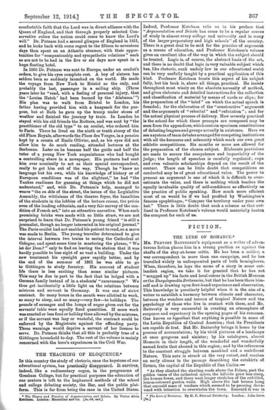THE TEACHING OF ELOQUENCE.*
Iat this country the study of rhetoric, once the keystone of our educational system, has practically disappeared. It survives, indeed, like a rudimentary organ, in the programme of Gresham College, but for practical purposes the education of our orators is left to the haphazard methods of the school and college debating society, the Bar, and the public plat- form. This is fax from being the case in the United States.
• The Theory and Practice of Argumentation and Debate. By "Victor Alvin Zatchara. London: )r..-min.o. and Co. [to.foi. net.]
Indeed, Professor Ketcham tells us in his preface that "Argumentation and Debate has come to be a regular course of study in almost every college and university and in many of the larger preparatory and high schools " of the country. There is a great deal to be said for the practice of argument as a means of education, and Professor Ketcham's volume gives an excellent idea of the way in which the subject should be treated. Logic is, of course, the abstract basis of the art, and there is no doubt that logic (a very valuable subject which has, like rhetoric, sunk unduly low in our educational scale) can be very usefully taught by a practical application of this kind. Professor Ketcham treats this aspect of his subject fully, but his book is, above all things, practical. He insists throughout most wisely on the absolute necessity of method, and gives elaborate and detailed instructions for the collection and classification of material by means of cards or slips ; for the preparation of the " brief " on which the actual speech is founded ; for the elaboration of the " constructive " argument and the arguments of "rebuttal" and " refutation " ; and for the actual physical process of delivery. How severely practical is the school for which these precepts are composed may be seen from the appendices, w hich contain specimen constitutions of debating leagues and groups actually in existence. Here we see a system of team debates arranged for competing institutions with all the keenness and solemnity which mark our own great athletic competitions. Six months or more are allowed for the preparation of the chosen subject. Elaborate provisions are made to secure the competence and impartiality of the judge ; the length of speeches is carefully regulated ; cups and even valuable scholarships depend on the result of the contest. There can be little doubt that competitions so conducted may be of great educational value. The power to present an argument is one of which it is difficult to over- estimate the value, and there is nothing which teaches the equally invaluable quality of self-confidence so effectively as the practice of public speaking. How much more efficient most of us would be if we had profited by Washington's famous apophthegm, "Conquer the territory under your own hat." There is little doubt that such a scheme as that out- lined in Professor Ketcham's volume would materially hasten the conquest for each of us.


































 Previous page
Previous page